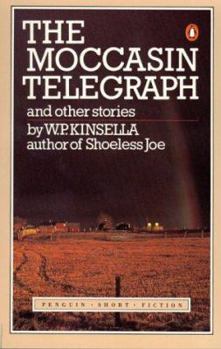The Moccasin Telegraph and Other Stories
Select Format
Select Condition 
Book Overview
A story collection by W. P. Kinsella. This description may be from another edition of this product.
Format:Paperback
Language:English
ISBN:0140083634
ISBN13:9780140083637
Release Date:November 1985
Publisher:Penguin Group
Length:196 Pages
Weight:3.40 lbs.
Dimensions:1.0" x 7.0" x 5.0"
Customer Reviews
2 ratings
Native Americans Continue to Struggle with the White Man's World . . . but with Humor
Published by Thriftbooks.com User , 16 years ago
W.P. Kinsella achieved fame with his baseball fiction, particularly "Shoeless Joe" (the basis for the movie "Field of Dreams"). But he also deserves recognition, and acclaim, for his numerous books of short stories about modern Native Americans and their continuing effort to cope with the White Man's society, bureaucracy, ignorance, and condescension. THE MOCCASIN TELEGRAPH AND OTHER TALES is one of at least four such collections of short stories by Kinsella. In THE MOCCASIN TELEGRAPH and several of the other collections, the narrator is Silas Ermineskin, a savvy Cree Indian living on a reservation in Alberta, Canada. (I very much doubt that the tone of the stories would be any different were they instead set on a reservation in the United States.) Silas has a much keener sense of people's weaknesses and foibles -- indeed, of the human condition -- than most of those around him, both Caucasian and Indian. His stories highlight the cultural clashes and incongruities between the Indians and the surrounding, dominating White society. As between the two, there is no mistaking where Kinsella's sympathies lie. Sometimes the stories rely on gentle irony, though other times they are rather heavy-handed, but always they are told with an earthy wry humor. They also are populated with distinctive characters, although several come uncomfortably close to being stereotypes. Especially noteworthy among the recurrent characters are Frank Fence-post and Big Etta. Some readers might be put off by the narrative style. Silas Ermineskin tells his stories in broken, ungrammatical English that can become somewhat annoying. (Random example: "We have us a lot of fun. Everybody is get good and drunk.") I have no idea whether it is authentic; if it is, I guess Kinsella can be excused. Hailing as I do from south of the relevant border, I am struck by how Canada and the Royal Canadian Mounted Police have treated Native Americans in much the same arrogant, ignorant, deceitful, and racist manner as have the United States and the FBI. (See, e.g., Hendricks, "The Unquiet Grave: The FBI and the Struggle for the Soul of Indian Country.") But it would be wrong to leave the impression that THE MOCCASIN TELEGRAPH is some sort of liberal or politically correct screed. The Indians are not noble heroes; they are human. Nor are all the whites bogeymen. The real value of the collection is not as social commentary or polemics, but rather simply as stories -- and entertaining and funny stories, at that. As such the book should be considered for student reading by high school teachers or administrators who emphasize, or answer to a community that emphasizes, literature that reflects cultural diversity. I live in Santa Fe, New Mexico, and each of my three sons has had English courses that go out of their way to feature material written from the perspective of minorities. Some of that material was execrable. Much preferable would have been THE MOCCASIN TELEGRAPH.
Very real stories about very real people
Published by Thriftbooks.com User , 23 years ago
Kinsella paints a somewhat bleak yet very warming image of reservation life. It's hard not to feel personally connected to the main characters, in part because of the slightly naive writing style of Silas Ermineskin, the young Native American writer through whom these stories are told.The subjects of the stories are very real people, with very real problems and emotions: love, jealousy, poverty, shame, friendship. The secluded community they live in accents these emotions, and the distrust from whites and their relative poverty sometimes adds a bittersweet taste to the stories. But there is humour and happiness, too, when Frank Fence-post dreams up another one of his stories, or Big Etta comes into view.I picked up this book after reading Shoeless Joe and The Iowa Baseball confederacy. I was surprized at how different in tone and style these stories are; Kinsella could be two writers for producing such dissimilar works. What they have in common is a kind of magic, the big and little wishes and dreams that everybody subconsciously has. I thouroughly recommend these stories to anyone with a taste for personal feeling over action.






